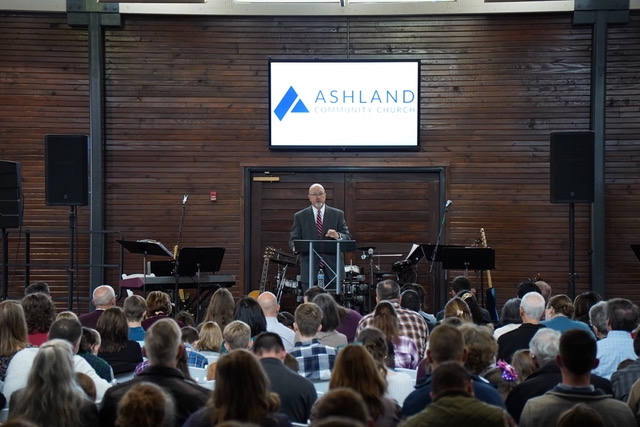 [1]
[1]LA GRANGE, Ky. (BP) – It may seem strange that the majority of those attending the launch service of Ashland Community Church Nov. 13 weren’t actually members. Most were friends and supporters who had been active in various ways to help the congregation one day become self-sustaining.
But when you know the history it’s not strange at all. It even gives you a peek into Ashland Community’s future.
Five years ago, the people at Buckner Baptist Church weren’t sure what to do. They had the desire to share the Gospel. They had facilities. They had a remnant from days gone by wanting to follow God’s leading. They just didn’t seem to have traction.
Under a different name, today they have all of those. And it started with a conversation.

Ashland Avenue Baptist Church in Lexington has now helped two churches launch and become self-sustaining through its campus-to-plant model. It’s a method of church planting, but starting with an existing congregation that has not witnessed growth in a while and needs a partner, not to mention a new beginning.
“The idea is we come in and place a pastor on site,” said David Prince, Ashland Avenue’s pastor. “We tell them, ‘You’ve been worrying about surviving. We have resources and a strategy in hand. We want you to start thinking about thriving.”
At this point, the church becomes a campus of Ashland Avenue, which absorbs all financial responsibilities. “They become a part of our ministry,” Prince said, “with the view that one day we would release them to become self-sufficient.”
Ashland Avenue’s first effort came in 2010 when members of a church about to close its doors reached out. That church became Ashland Madison County with Ashland Avenue Associate Pastor Jeremy Haskins also serving as the new church’s pastor.
Ashland Madison County became Ashland Church in 2018, a self-sustaining congregation with Haskins as lead pastor.
Members of Buckner Baptist had heard Ashland Church’s story and approached Prince. They agreed to enter the same arrangement.
After a time of planning and under a new name, Ashland Oldham County emerged with Casey McCall, associate pastor of Ashland Avenue, as campus pastor, who would preach from the same text as Prince each week.
“They were a part of our congregational meetings [and] church members who just happened to meet somewhere else,” Prince said. “But it was always with a view to release them when they became self-sustainable and reproducible.”
The theme of dying to self repeats in the process. A church must be willing to give up the reins at the beginning. Ashland Avenue sends members to become members of a mission church’s core team.
“I tell our people, ‘Great news. We’re about to shrink again,” Prince said. “This isn’t about numbers on a sheet of paper. We believe that healthy churches plant churches.”
McCall, like Haskins, grew in discipleship under Prince and as a church leader while on staff at Ashland Avenue. He learned that the changes being seen at Ashland Community Church don’t happen quickly.
“Culture doesn’t change fast, and that’s probably the hardest part,” he said. “Coming in, there are things you don’t change overnight.”
Theological points such as the exclusivity of Christ and the authority of Scripture are non-negotiable, of course, and something that wasn’t a concern with the new church. However, other areas of ministry direction required trust in church leadership.
“You know your preferences and that change is hard, but it’s necessary,” McCall said, adding that such changes put you in a better position for future impact.
“At the launch service Sunday, we connected people to the bigger story of what God is doing,” he said. “The expectation from the beginning was to be an autonomous church that was financially independent, had leadership in place and become reproducible.
“We said that from the start. We want to be about planting churches. This is God’s plan and how the Great Commission gets fulfilled.”
